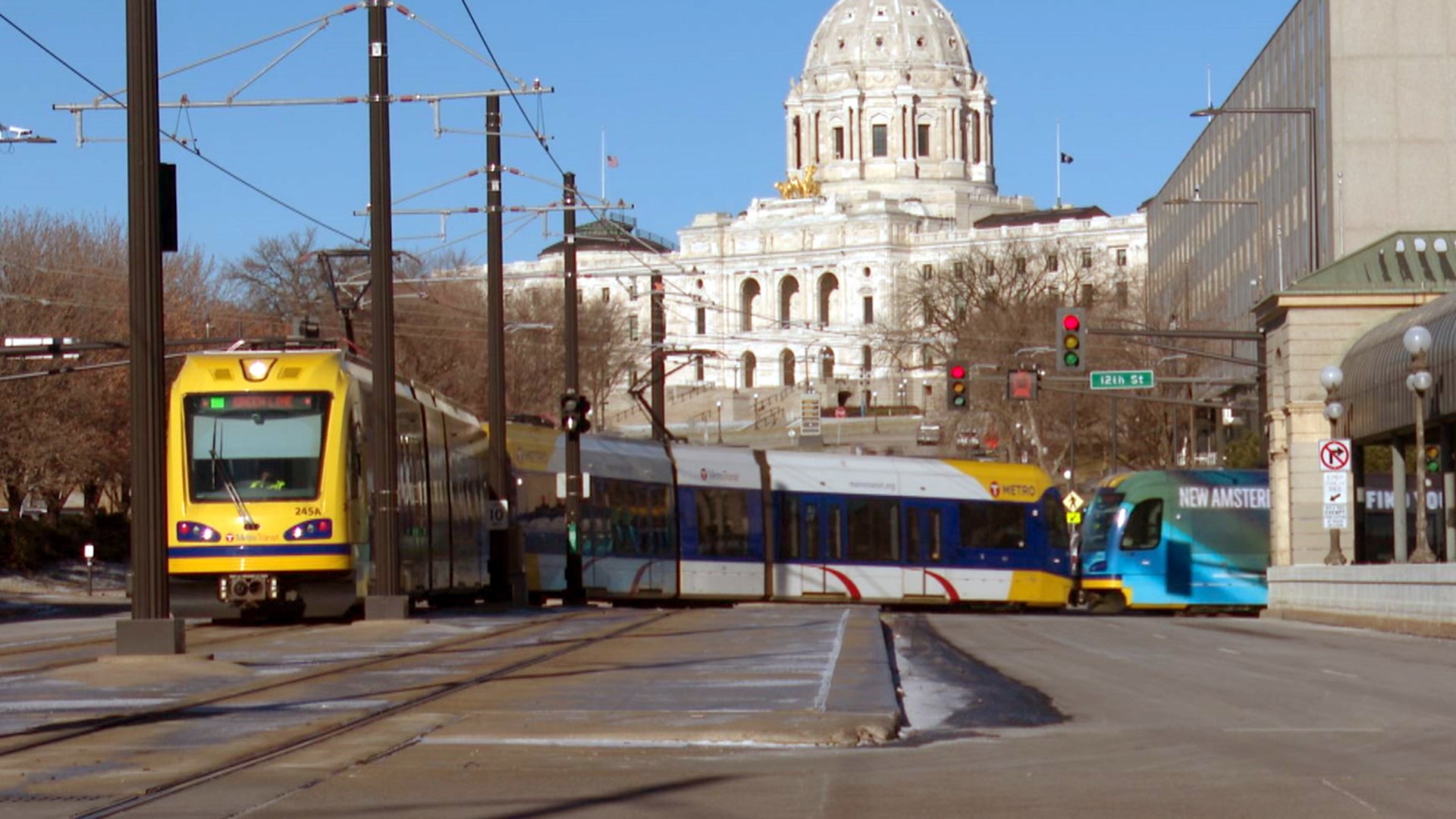ST PAUL, Minn. — If you ride a Metro Transit light rail train expect a more visible presence of different types of uniformed personnel, including sworn officers, community service officers, contract security and others looking to help passengers in a crisis and make sure they pay.
That’s thanks, in part, to a change in state law that allows non-sworn officers to do fare checks and write civil citations. It's all part of what the agency is calling the Transit Rider Investment Program.
"With this new approach, our CSOs have inspected over 1,900 fares and issued about 190 citations just in the first week alone," Metro Transit General Manager Leslie Kandaras told reporters outside Union Depot Tuesday.
The Met Council Wednesday will consider a new rider code of conduct, which will be printed on large signs posted throughout the transit system. It makes it clear a variety of activities aren't allowed on Metro Transit buses and trains, including smoking, doing drugs, playing loud music, littering and urinating.
"These revised rules for riding will provide more opportunity to clearly set and communicate expectations for everyone who’s riding Metro Transit," Kandaras explained.
She asserted the combination of community service officers, contract agents through Allied Security and outreach workers from the Transit System Intervention Project is having an effect on how riders view their trips. All of these actions will free up sworn officers to spend more time preventing and responding to criminal activity.
“We hear from our riders that having more official presence on the system helps contribute to their sense of safety, so we think growing this Transit Rider Investment Program will help riders continue to feel safe and comfortable while riding."
Metro Transit Police Chief Ernest Morales III says that crime on the transit system has dropped by 32% since the beginning of the year. He asserts having more people on trains and platforms taking part in mainly positive interactions with riders will drive that number down further.
"Our plan is simple: more people in more places," Morales told reporters.
"We feel by having our CSOs out there, uniformed presence, as well as supplemental security that people will feel safe because they'll have a friendly face around."
Morales and Kandaras pointed out Metro Transit has followed a mandate from state lawmakers to improve the rider experience, and to partner with a variety of nonprofits and local governmental entities to address those passengers who are experiencing homelessness or other crises.
"Community service officers will be equipped to help in particular a mental health crisis, substance abuse disorder, and have the tools to supply housing and job opportunities."
He said one advantage of adding more CSOs to the mix is to have a pool of potential transit police recruits.
"We believe if we focus on our community service officer recruitment plan that in the future three years from now, we’ll have a steady resource pool of candidates we can pull our police officers from," Morales remarked.
Ridership is nowhere close to pre-pandemic levels, and many of those weekday commuters of yesteryear are still working from home. But the number of riders has been rising steady on both the Blue Line and the Green Line, according to Metro Transit.
Metro Transit is inviting riders to take part in one of these listening sessions next month:
- Tuesday, Jan. 9: 1:30 p.m. – 4 p.m., Blue Line
- Wednesday, Jan. 10: 7 a.m. – 1:30 p.m., Green Line
- Thursday, Jan. 11: 11 a.m. – 1 p.m., Blue Line
- Friday, Jan. 12: 7 a.m. – 8:30 a.m., Green Line
Chief Morales, Kandaras and Met Council Chair Charlie Zelle all appeared at the State Capitol Tuesday for an interim hearing held by the House Transportation Committee.
Lawmakers wanted an update on the agency's multi-pronged efforts to attract riders back to the system, and to reduce criminal activity on trains and buses.
"We hear from property owners along the lines, from the airport personnel, from people that use our facilities that we’re improving," Chair Zelle told the panel.
"We’re not where we need to be, but we are definitely making headway."
Morales said police officers have spent more time riding on the trains. They'll park their patrol cars near the track, hop on the train for a few stops and then catch another train back to their vehicles.
Rep. Brad Tabke, a Shakopee Democrat, asked if Metro Transit was finding a good balance between enforcing the laws and treating homeless riders with dignity.
Kandaras and Morales both laid out in detail how the new initiatives have been working. They supplemented their testimony with this illustrated report.
Rep. John Petersburg, a Waseca Republican, asked Morales why enforcement efforts were focused more heavily on the Blue Line initially, as opposed to the Green Line.
The chief said it was based in part on his experience coming to Minnesota for the first time, riding the Blue Line before he was even hired. He worried about conditions on that train, which runs from Mall of America to downtown Minneapolis, passing through the Minneapolis-St. Paul International Airport on the way.
"We decided we would send a message that we are committed to cleaning up the perception of our light rail system, and then spreading that around," Morales explained.

